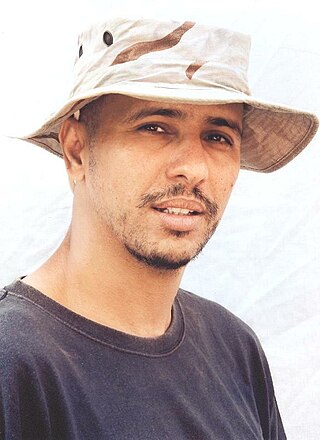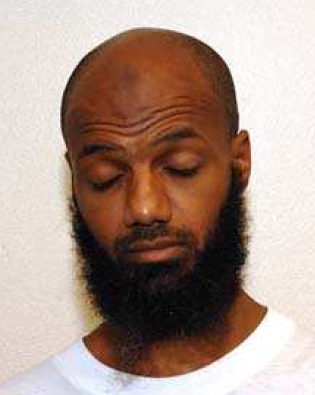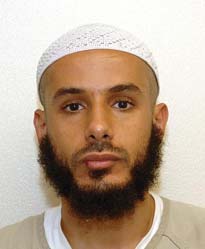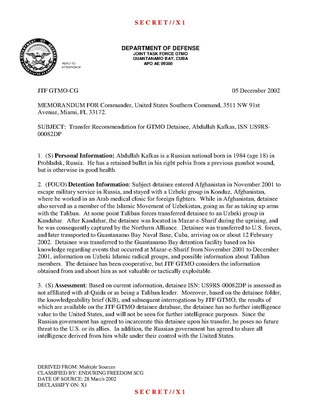Related Research Articles

Mohammed Mani Ahmad al-Qahtani is a Saudi citizen who was detained as an al-Qaeda operative for 20 years in the United States's Guantanamo Bay detention camps in Cuba. Qahtani allegedly tried to enter the United States to take part in the September 11 attacks as the 20th hijacker and was due to be onboard United Airlines Flight 93 along with the four other hijackers. He was refused entry due to suspicions that he was trying to illegally immigrate. He was later captured in Afghanistan in the Battle of Tora Bora in December 2001.

Mohamedou Ould Slahi is a Mauritanian engineer who was detained at Guantánamo Bay detention camp without charge from 2002 until his release on October 17, 2016.

Ammar al-Balushi or Amar Baloch; born Ali Abdul Aziz Ali on 29 August 1977) is a Pakistani (Balochi) citizen who has been in American custody at the Guantanamo Bay detention camp since 2006. He was arrested in the Pakistani city of Karachi in 2003 before being transferred; the series of criminal charges against him include: "facilitating the 9/11 attackers, acting as a courier for Osama bin Laden and plotting to crash a plane packed with explosives into the U.S. consulate in Karachi." He is a nephew of the Pakistani terrorist Khalid Sheikh Mohammed, who served as a senior official of al-Qaeda between the late 1980s and early 2000s; and a cousin of the Pakistani terrorist Ramzi Ahmed Yousef, who played a key role in the 1993 World Trade Center bombing, the Philippine Airlines Flight 434 bombing, and the high-profile Bojinka plot.
Abdul Rahim Hussein Muhammed Abdu al-Nashiri is a Saudi Arabian citizen alleged to be the mastermind of the bombing of USS Cole and other maritime attacks. He is alleged to have headed al-Qaeda operations in the Persian Gulf and the Gulf states prior to his capture in November 2002 by the CIA's Special Activities Division.

Binyam Ahmed Mohamed, also referred to as Benjamin Mohammed, Benyam Mohammed or Benyam Mohammed al-Habashi, is an Ethiopian national and United Kingdom resident, who was detained as a suspected enemy combatant by the US Government in Guantanamo Bay prison between 2004 and 2009 without charges. He was arrested in Pakistan and transported first to Morocco under the US's extraordinary rendition program, where he claimed to have been interrogated under torture.

Fouzi Khalid Abdullah Al Odah is a Kuwaiti citizen formerly held in the United States Guantanamo Bay detainment camps, in Cuba. He had been detained without charge in Guantanamo Bay since 2002. He was a plaintiff in the ongoing case, Al Odah v. United States, which challenged his detention, along with that of fellow detainees. The case was widely acknowledged to be one of the most significant to be heard by the Supreme Court in the current term. The US Department of Defense reports that he was born in 1977, in Kuwait City, Kuwait.
Lahcen Ikassrien is a citizen of Morocco who was held in extrajudicial detention in the United States Guantanamo Bay detainment camps, in Cuba. Ikassrien's Guantanamo ISN was 72. The Department of Defense reports that Ikassrien was born on October 2, 1972, in Targuist, Morocco.
Saad Madi Saad al Azmi is a Kuwaiti citizen. He was held in extrajudicial detention in the United States Guantánamo Bay detainment camps, in Cuba, and later repatriated on November 4, 2005. Joint Task Force Guantanamo counter-terrorism analysts report that al-Azmi was born on May 29, 1979, in Doha, Kuwait.
The Guantanamo Bay detention camp, also known as GTMO, GITMO, or simply Guantanamo Bay, is a United States military prison within Naval Station Guantanamo Bay (NSGB), on the coast of Guantánamo Bay, Cuba. It was established in January 2002 by U.S. President George W. Bush to hold terrorism suspects and "illegal enemy combatants" during the Global War on Terrorism following the attacks of September 11, 2001. As of January 2025, at least 780 people from 48 countries have been detained at the camp since its creation, of whom 756 had been transferred elsewhere, 9 died in custody, and 15 remain.
Adel al Zamel is a citizen of Kuwait who was held in extrajudicial detention in the United States Guantanamo Bay detention camps, in Cuba.

Khalid Abdullah Mishal al Mutairi, also known as Khalid Hassan, is a Kuwaiti charity worker who was unlawfully detained in the United States Guantanamo Bay detainment camps, in Cuba. He was ordered released in August 2009, when it was determined that the law required the American government to prove his guilt, rather than demand al Mutairi prove his innocence. The ruling judge noted that al Mutairi had been "goaded" into making incriminating statements for interrogators, such as confessing alongside Osama bin Laden in 1991, while noting that some of his stories were contradictory.

Faiz Mohammed Ahmed Al Kandari is a Kuwaiti citizen who was held in extrajudicial detention in the United States' Guantanamo Bay detainment camp in Cuba, from 2002 to 2016. He has never been charged with war crimes.

Rasul Kudayev is a Russian citizen who was held in extrajudicial detention in the United States Guantanamo Bay detention camp in Cuba.
Abdallah Saleh Ali Al Ajmi was a Kuwaiti citizen, who was held in extrajudicial detention in the United States Guantanamo Bay detainment camps, in Cuba. His Guantanamo Internment Serial Number was 220. Joint Task Force Guantanamo counter-terrorism analysts reports indicated that he was born on 2 August 1978, in Almadi, Kuwait.
Ahmed Mohammed Ahmed Haza al-Darbi is a citizen of Saudi Arabia who was held in the United States Guantanamo Bay detainment camps, in Cuba from August 2002 to May 2018; in May 2018, he was transferred to Saudi Arabia's custody. He was the only detainee held at Guantanamo released during President Donald Trump's administration.
Majid Shoukat Khan is a Pakistani who was the only known legal resident of the United States held in the Guantanamo Bay Detainment Camp. He was a "high value detainee" and was tortured by U.S. intelligence forces.
Khalid al-Odah is the father of Guantanamo Bay detainee, Fawzi al-Odah, and the founder of the Kuwaiti Family Committee, a group established in 2004 to heighten global awareness of the prisoners in Guantanamo Bay. Over the past five years, Khalid has waged legal, media, and public relations campaigns to promote the need for due process for the prisoners at Guantanamo. In 2004, Khalid brought his son's case to the Supreme Court Rasul v. Bush/ al-Odah v. Bush.

Sharqawi Abdu Ali al-Hajj, also known as Riyadh the Facilitator, is a Yemeni alleged Al-Qaeda associate who was held in the United States' Guantanamo Bay detention camps, in Cuba. He was accused of being a "senior al-Qaida facilitator who swore an oath of allegiance to and personally recruited bodyguards for Osama Bin Laden".
In late 2008, the Department of Defense published a list of the Guantanamo captives who died in custody, were freed, or were repatriated to the custody of another country. The list was drafted on October 8, 2008, and was published on November 26, 2008. Subsequently almost two hundred more captives have been released or transferred, and several more have died in custody.
References
- ↑ "JTF- GTMO Detainee Assessment" (PDF). nyt.com. Retrieved 14 July 2023.
- ↑ Sketches of Guantanamo Detainees-Part II, The Guardian , March 15, 2006
- ↑ OARDEC (2006-05-15). "List of Individuals Detained by the Department of Defense at Guantanamo Bay, Cuba from January 2002 through May 15, 2006" (PDF). United States Department of Defense . Retrieved 2007-09-29.
- 1 2 "Detainee freed after eight years at Guantanamo". Television New Zealand . December 10, 2009. Retrieved September 30, 2011.
- ↑ Carol Rosenberg (2008-10-22). "Pentagon accuses 2 Kuwaitis of war crimes". Miami Herald. Archived from the original on October 23, 2008. Retrieved 2008-10-22.
- ↑ Jeremy Pelofsky (2009-08-13). "Lawyer: U.S. hampers bid to clear Guantanamo detainee". Reuters. Archived from the original on 2009-08-14. Retrieved 2009-08-13.
- ↑ "Pentagon documents on Fouad al Rabia" (PDF). Department of Defense. Archived from the original (PDF) on 2009-03-01. Retrieved 2008-12-18.
- 1 2 Jenifer Fenton (2011-10-28). "Former Guantanamo inmates tell of confessions under 'torture'". CNN. Archived from the original on 2012-01-15. Retrieved 2011-10-29.
He showed more of the evidence used against him. The U.S. government had accused Al Rabiah of providing material support to al Qaeda and the Taliban. Al Rabiah was interrogated, by his own count, more than 200 times. He says he was tortured: "Lots and lots of torture." He confessed to any and everything his interrogators said about him.
- ↑ B Izzak (May 12, 2007). "US to free last Kuwaiti Guantanamo detainees". Kuwait Times. Archived from the original on May 18, 2011. Retrieved 2007-05-14.
- ↑ Carol Rosenberg (2009-09-17). "Judge: Free Kuwaiti engineer at Guantánamo". Miami Herald. Archived from the original on 2009-09-20.